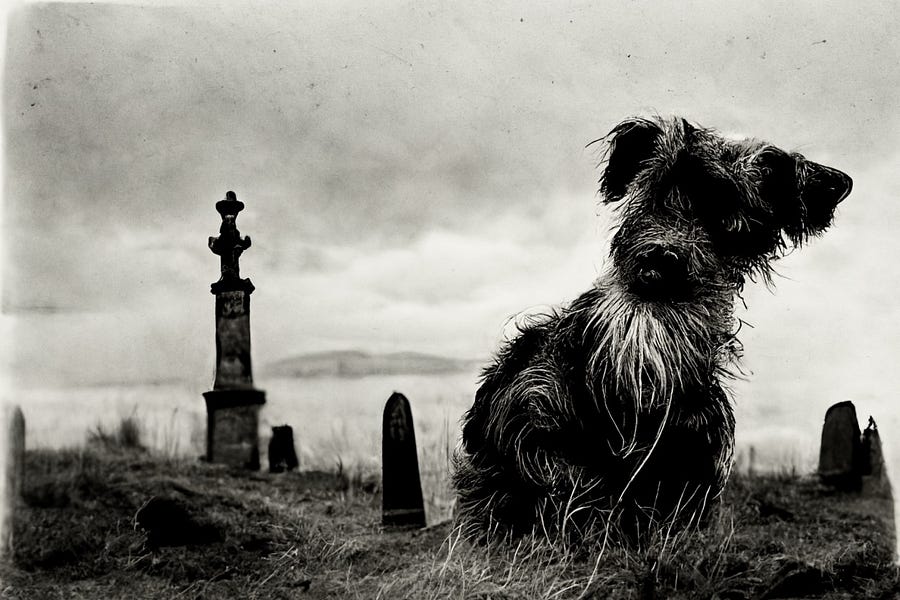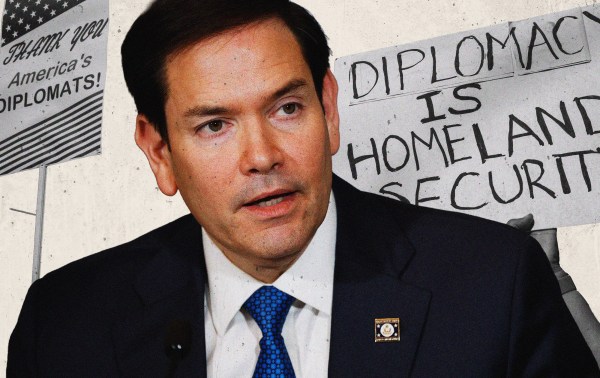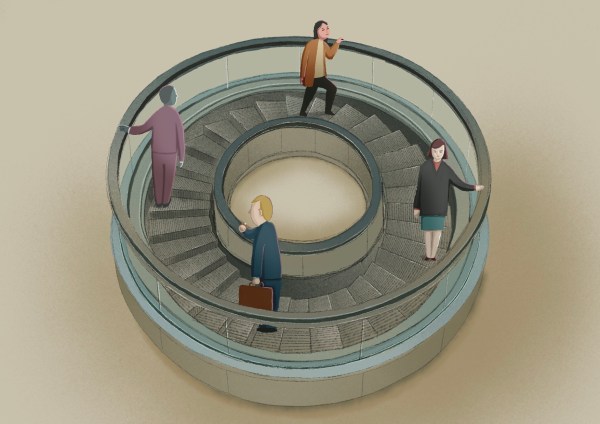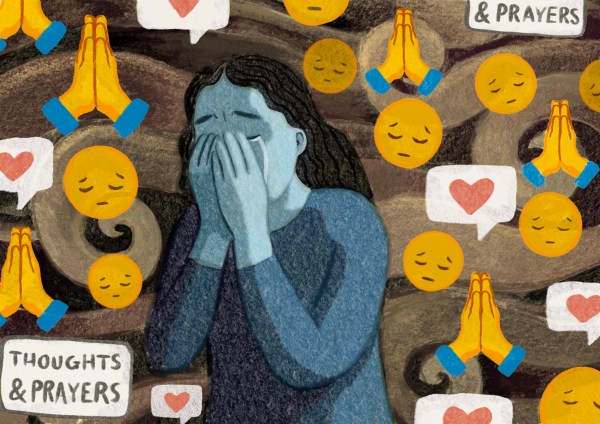There appears to be something online called a “Fame Meter.” It offers various “most famous people” lists: the most famous people who were born today, or who were born on your birthday, or who died in a given year. Apparently the year 1872 was a bad year for famous people dying (a rather inelegant way of putting it), meaning that “not many famous people died in this year versus people who died in other years.” If the Fame Meter is to be believed, the most famous person to have died in 1872 was Benito Juárez, a former Mexican president, which would indeed qualify it as a weak year. Still, scanning the list, one sees little reason to quibble with the overall claim that 1872, all things considered, was a good year to be alive if you happened to be a famous person.
Yet one rather famous death does not make the list at all: Greyfriars Bobby also died 150 years ago. Some readers may know of Greyfriars Bobby—Scotland’s most famous dog—from a 1961 Disney film of that name. Others may know him as the hero of the book on which Disney’s movie was based, Eleanor Atkinson’s 1912 novel Greyfriars Bobby. I no longer read many dog books, though as a teenager I devoured the novels of Albert Payson Terhune, a prominent collie breeder who wrote popular stories, mostly about some of his own dogs, which left me longing (in vain) for one of my own. From Terhune I learned the important bit of life wisdom that “a collie down is never a collie beaten.”
Based on a true story, Greyfriars Bobby tells of a Skye terrier, Bobby, whose master, a poor shepherd named Auld Jock, was released from work and went to the city of Edinburgh, where he quickly fell ill and died. The grieving Bobby then snuck into Greyfriars Kirkyard, where Auld Jock was buried, to watch over the grave. Despite one challenge after another—attempts to reclaim him by his actual owner, the farmer for whom Auld Jock had worked; repeated efforts to expel him from the kirkyard, where no dogs are allowed; a mean-spirited plan to seize him for not having a proper license; and even getting locked inside the grounds of Edinburgh Castle one night, high above the city on Castle Rock—the faithful Bobby returns night after night.
The handsome and good-tempered terrier is happy enough to play with the poor children of the city’s tenements, whose hearts he quickly wins, and to be fed by the kind and sagacious innkeeper, Mr. Traill. But Bobby is unwilling to sleep anywhere but on Auld Jock’s grave. Eventually his loyalty is rewarded when the city’s Lord Provost gives him a license, a collar, and the run of the city, and Lady Burdett-Coutts erects a statue in his honor across from Greyfriars. (The statue still stands.)
It is interesting to ponder what makes a book about a faithful dog as touching to read as Greyfriars Bobby surely is. It is not great literature—Atkinson’s efforts to replicate Scots brogue wear a bit thin—but it is at least very good literature, which is no slight achievement. Mary Paulson-Ellis, in her introduction to my copy, speculates that “perhaps the novel’s popularity … has to do with our enduring love of animal stories.” Fair enough. But why should we have an enduring love of animal stories?
In Bobby’s case, it is clearly his deep loyalty to his master that moves us, just as it moves the townspeople and especially the children in the novel. Mr. Traill, attempting to prevent Bobby’s being seized for the lack of a license, is “filled with a fierce championship of the wee Highlander, whose loyalty to that dead master had brought him to this strait.” The tenement children, looking out their windows in the evening to see Bobby lying on Jock’s grave, know, whether they can see him in the dusk or not, that “he was always there after sunset, keeping watch and ward, and ‘lanely’ because his master had gone away to heaven.” The little dog is known as the “living embodiment of affection and fidelity.”
But I think it is a little more complicated than this. Loyalty is, by and large, a good thing, but we do not always admire it. One can be loyal to wicked people or false gods, can wrong one person out of loyalty to another, can fail to see when loyalty is leading one astray. In order to admire acts of loyalty, we want them to be combined with a certain kind of good judgment. Indeed, this might make it even more puzzling that we would admire the loyalty of a dog, which is incapable of such judgment. Atkinson catches a glimpse of the almost comic nature of our attraction to this canine loyalty: “To insist that a dog feels, that he loves devotedly and with less calculation than men, that he grieves at his master’s death and remembers him long years, brings a smile of amusement.” He loves “with less calculation than men.” The dog’s loyalty really is blind.
But perhaps that very fact helps explain its appeal. Bobby’s loyalty to Auld Jock is not misplaced, but if it were, we would not blame Bobby, because we don’t hold a dog responsible in that way. In the dog—unlike in a human being—we have the opportunity to admire loyalty pure and simple, blind loyalty, innocent loyalty. Loyalty as it might be if the world were not fallen. Were people not sinful, we could be whole-heartedly loyal with no need for special judgment and no fear that our loyalty might be betrayed or prove misguided. I suspect this is the reason why our admiration for a dog’s loyalty is always tinged with just a slight hint of melancholy. In Bobby we see the kind of loyalty we all wish we could feel, but that for now is never entirely permitted us.
That melancholy has an additional source. If we sense that a pure and unreserved loyalty seems to belong to another and better world, so too do we sense that only those capable of loyalty will ever attain to that world. Committing one’s self in love and fidelity involves a risk, a risk of getting things wrong. But without that commitment, Bobby’s perfect loyalty, for which we long, remains out of reach.
Atkinson senses this, and draws the link from dog to human being, in a comment at the novel’s climax. Bobby is trapped up at the castle and seeking escape. With every other exit barred, his only route back to Auld Jock is straight down the cliff face of Castle Rock. It is an all but impossible descent. As he prepares to plunge down the edge, a deep fog descends. He can see nothing, cannot get a footing, has no familiar smells to guide his way. He hesitates. “Everything warned Bobby to lie still in safety until morning and the world was restored to its normal aspects,” writes Atkinson. “But ah! in the highest type of man and dog, self-sacrifice, and not self-preservation, is the first law. A deserted grave cried to him across the void, the anguish of protecting love urged him on to take perilous chances.” And down he goes—a mission that very nearly costs him his life.
Self-sacrifice, and not self-preservation, is the first law of loyalty. If I am right that we look on Bobby’s loyalty with that faint hint of melancholy, it is not only because we, possessing reason, cannot quite afford to display a loyalty like his. It is also because we know what it might cost us.






Please note that we at The Dispatch hold ourselves, our work, and our commenters to a higher standard than other places on the internet. We welcome comments that foster genuine debate or discussion—including comments critical of us or our work—but responses that include ad hominem attacks on fellow Dispatch members or are intended to stoke fear and anger may be moderated.
With your membership, you only have the ability to comment on The Morning Dispatch articles. Consider upgrading to join the conversation everywhere.